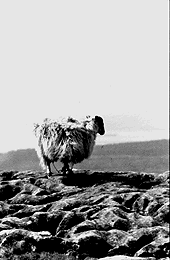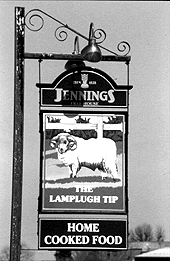| Sheepfolds to Visit | |
News | Education | Images | Accessibility | Search | Links |
  |
A study of the place names of Cumbria associated
with sheep farming can link Gimmer Crag - meaning sheep crag from the Cumbrian dialect word 'gimmer', a female sheep; Lambrigg - meaning lamb’s ridge from the Old Norse 'lambi', lamb and 'hryggr', ridge; Sheffield Pike - meaning sheepfold pike from the Old English 'sceap', sheep, and 'fald', fold; Soutergate - meaning sheep road from the Old Norse 'sauthor', sheep and 'gata', path; Souterstead - meaning place for sheep from Old Norse 'sauthor', sheep and Old English 'stede', place; Wetheral - corner where sheep were kept from Old English 'wether', sheep and 'halh', corner. In addition, there are hundreds of place names in Cumbria which indicate the sites of sheep farming. Any name with the elements 'scale', 'booth', 'set' or 'side' are probably places where there were 'sheales' or 'shielings', the Old Norse words for a summer hut used when moving sheep to different grazing areas. Place names with 'erg' in them have the same meaning, but have Celtic origins.(10) As well as place names, Cumbrian
farmers use many old dialect words associated with sheep and shepherding,
for example 'hoggs', 'gimmers', 'shearlings', 'mules', 'tups'
or 'tips', 'smits' or 'woolmarks'. The origin of a word like 'lug' for an ear is thought to derive from the Old Norse word 'log' meaning law and resulting from the clipping of sheep's ears to establish their ownership (11) The phrase 'pin money' has its likely origins in the payment made to allow stray animals to be released from the local pound or 'pinfold'. The community often employed someone to impound sheep or cattle found grazing on the wrong land and his title was the 'pinder', which has subsequently become a surname in several parts of the country. Again, the life of shepherds and drovers, their routines, their folk-tales and their language can provide rich starting points for children's' own work, storytelling and poetry (see section THREE for examples), as well as reading the work of other writers like Wordsworth's poem about the shepherd 'Michael’. (12)
|

|
|
© 2002 Copyright
Information
|
.